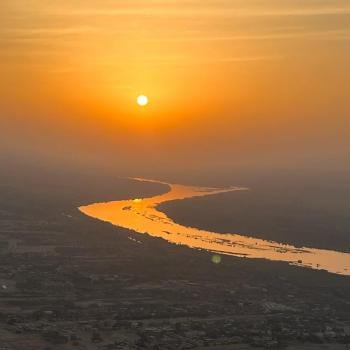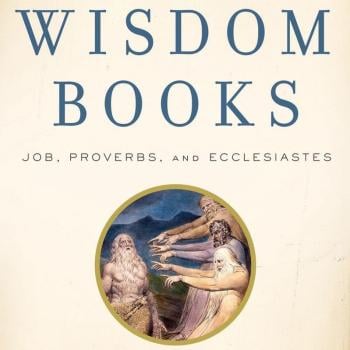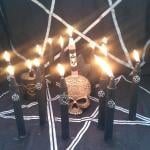If you have not had a chance to see “Of Gods and Men,” the winner of all sorts of film prizes, including the Grand Prix at Cannes, you should drop everything and watch it, and all the more so when Osama bin Laden has just been murdered. Yes, I said murdered. When an unarmed civilian, criminal or not, is killed rather than captured, that would be murder. Yes I realize he is responsible for many many murders. Yes I realize that there is some justice in what happened to him. But before you decide how a Christian should feel about all that, I urge you to see this movie, a movie about French monks who decided to stay in the face of the Mujahadeen uprising and continue to serve the people of their village.
Let me set the scene for you. Here is the official precis —– “Eight French Christian monks live in harmony with their Muslim brothers in a monastery perched in the mountains of North Africa in the 1990s. When a crew of foreign workers is massacred by an Islamic fundamentalist group, fear sweeps though the region. The army offers them protection, but the monks refuse. Should they leave? Despite the growing menace in their midst, they slowly realize that they have no choice but to stay… come what may. This film is loosely based on the life of the Cistercian monks of Tibhirine in Algeria, from 1993 until their kidnapping in 1996.”
This movie is so rich and thought provoking it really requires multiple viewing. In an era of increasingly superficial, trivial, bland and bad films that try and compensate for their short-comings by revved up CG or 3D technology, it is refreshing to see a film like this which is so profoundly thought provoking, especially for Christians. Were these monks ‘fools for Christ, were they wise to stay and support their villagers who needed their medical treatment and help in so many ways, should they have fled? What was the appropriate Christian response, or were there several possible ones? Very few Christians seek of martyrdom like Ignatius of Antioch did. They do not long for it, but as Bonhoeffer said last century— ‘When Christ calls a person, he bids him come in die’. In principle dying to self and living for Christ, or taking up a cross, and being willing to be nailed on it, comes with the territory of being a serious committed Christian person. One doesn’t have to have a death or a lust for the fame of martyrdom to realize this is part of the covenant with God.
There are many moving scenes in this movie, not the least of which is simply watching the simple, clean, wholesome, good life in the monastery, working with hands, tending the sick, feeding the hungry, singing the mass, praying with each other, loving the brotherly fellowship, living simply. The story is simple, genuine, true, and profound all at once. We see the monks with their shortcomings and strengths. We see the crisis of faith for one or two when they realize they may genuinely face death. And we would not know this tale at all, were it not for the fact that two of the monks escaped notice of their captors who took them to exchange them as prisoners for some of their captive fellow Mujahadeen. One of them is remarkably still alive to tell the tale, and one of the survivors died in 2008.
The cast of this movie is remarkable and very believable. One or two of the actors you may recognize, for instance the one who plays Luc the monk with doctoring skills is Michael Lonsdale and Lambert Wilson plays the head monk Brother Christian. No one knows how they will react in the face of imminent and violent death until they actually are placed in that spot. And so we see the struggle these monks have in deciding whether to stay or to leave before all Hades breaks loose. It is interesting that the villagers said ‘we are the little birds and you are the tree holding us up’ whilst one of the monks said ‘the good shepherd does not leave his flock and flee in the face of the hungry wolves’. But there are not just the life and death dialogues, there are many light and touching scenes as well. Here is a trailer to check out
http://www.youtube.com/watch?v=8xG3F-GUbnwThe movie is two hours long, but in some ways it seems so much longer. This is because of its deliberately slow, steady cumulative pace. Unlike many contemporary films, the director is sensitive to the fact that the subject matter of this film is in many ways non-violence, and so he does not seek to glorify violence, or frankly even to give it the time of day— you do not watch anyone being shot in this film, though there are some of the dead shown after the fact. It is such a refreshing change.
I must say I love the interaction in this film not only between the brothers themselves who clearly love and support one another and are all joyful Christians who love to sing God’s praises, but between them and their Muslim villagers who equally love the brothers and respect them, and came to dependent on them. In a world that mistakes meekness for weakness, and nonviolence for lack of nerve and bravery, this film gives the lie to all such thoughts and misapprehensions about Christianity. Which takes more strength of character, to stare down an assassin until he stands down with no weapons in one’s hands but love and faith and hope and prayer, and a few good words, or to face them armed to the teeth? I say it takes much more courage to do the former. What looks like foolhardiness to the world, is simply being prepared to be a fool for Christ and not defile one’s witness to the Prince of Peace by taking someone else’s life.
I urge you, if you only see one film this year, let this be the one, and ask yourself if you could have been one of these monks, ask yourself if you have enough Christian faith to do what they did, ask yourself if you believe what John Donne said “‘any man’s death diminishes me, for I am a part of mankind, therefore do not seek to know for whom the bell tolls, it tolls for thee.” And if that is true, then Osama bin Laden, for whom Christ also died, is not a person whose death we should be celebrating. We may feel relief, we may feel justice has been done, but we should also realize that we have failed, failed miserably, in our mission to convince even our enemies with our lives and words and deeds that Jesus Christ is Lord and the Prince of Peace. “Do not repay anyone evil for evil…Do not take revenge…but leave room for God’s wrath…On the contrary ‘If your enemy is hungry, feed him, if he is thirsty, give him something to drink. In doing this, you will heap burning coals on his head.’ Do not be overcome by evil, but overcome evil with good.” (Rom. 12.17ff.).















